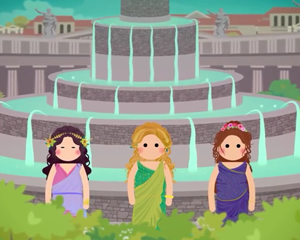For one, it's still relevant today.
首先,它在今天仍然适用。
In the early days of the wars in Iraq and Afghanistan, thousands of theater companies staged readings and productions of the play.
伊拉克战争和阿富汗战争早期,有成千上万家戏剧公司策划了这部戏剧的朗读和制作。
The Lysistrata's frustration at the senselessness of wars and the tolls they exact won't seem very ancient to us.
《吕西斯特拉忒》里对“战争的无感和通行费的征收”所产生的失望感和如今的我们产生了共鸣。
Also it's one of the rare ancient comedies in which the women get to be really funny. So that's nice.
这也是非常稀罕的古代喜剧之一,里面的女人非常有意思。所以就很推荐。
(But remember, all the actors in ancient Greek theater were men! And all the playwrights, too.)
(但是记住,古希腊剧院里所有的演员都是男人!包括所有的剧作家也是。)
Anyway. Let's go to the Thoughtbubble. The Lysistrata won first prize in 411 BCE, at which point the Peloponnesian War had waged for about twenty years.
总之,我们来看一下思想泡泡。《吕西斯特拉忒》于公元前411年荣获一等奖,那时伯罗奔尼撒战争已经进行了大约20年的时间。
Athens and Sparta together defeated an enemy once thought unstoppable: the Persians.
雅典人和斯巴达人联合打败了他们曾号称永不战败的敌人——波斯人。
But after their victory, they squabbled over colonies. Sparta had the superior land army, Athens had the superior navy.
胜利之后的他们开始为争夺殖民地而争吵,斯巴达有强大的陆军,雅典有强大的海军。
Athens was a democracy, Sparta was an oligarchy.
雅典是民主政体,斯巴达是寡头政体(由极少数的奴隶主上层分子掌权)。
Athens had a lot of money, Sparta had a lot of staying power. Things got ugly and stayed ugly.
雅典资金充足,斯巴达则后劲儿强。矛盾越来越大,越来越大~。
Also Athens had a plague that killed a lot of its citizens and its great leader Pericles. That definitely didn not help.
在此期间,雅典还爆发过一场瘟疫,导致了很多市民以及伟大的领袖伯里克利(古雅典政治家)的丧生,这当然是火上浇油。
So this is the background story for The Lysistrata, at the start of which, the women of Athens are fed up.
这是《吕西斯特拉忒》的故事背景,在故事的开头,雅典的女人们已经忍无可忍了。
They're tired of war, they're tired of being poor and they're really, really tired of their husbands leaving to fight.
她们厌倦了战争、厌倦了贫困、她们真的、真的厌倦了自己的丈夫离开自己去打仗。
Because when their husbands are away, they can't have sex. And in The Lysistrata, these women really want to have sex.
因为她们的丈夫不在的时候,她们就不能进行性行为,《吕西斯特拉忒》里的女人们性欲真的很强。
So led by a woman named Lysistrata, they devise a so-far-fetched-it-just-might-work plan.
于是,在一名叫“吕西斯特拉忒”的女人的带领下,他们设计了一个“可能迄今都行之有效”的计划。
They seize control of the Acropolis, which is where Athens keeps all its money, and they say they're not going to give up the siege and they will not have any sex until the men stop fighting.
他们控制了(古希腊都城的)卫城,那里是雅典的国库,并且她们说不会放弃围城,也不会进行性行为,直到男人们停止打仗。
To show that they're really serious, they get a bunch of women from warring areas, like Sparta and Corinth, to join them.
为了证明她们没开玩笑,他们让一群交战地区的女人们也加入了她们,比如斯巴达和科林斯地区。
The women swear an oath and achieve a truce, showing the men that it can be done.
女人们宣誓停战,向男人们证明这是可以做到的。
Thanks, Thoughtbubble.
谢谢思想泡泡。

I'd love to quote the chaste ladies oath for you.
我很想跟你们讲讲这些忠贞女士的誓言。
But it's a family show and this oath is filthy, which is sort of the point.
但这是一场家庭内部秀,而且这个誓言很肮脏下流,这是重点。
To begin with, the women prepare a sacrificial victim, but instead of killing an animal, the sacrifice they make is to open a jug of wine, which they're obviously going to chug.
女人们准备了一个献祭的牺牲品,但是她们没有杀动物,她们准备的祭品是:打开了一壶酒,显然是要大醉一场。
And then they swear to not let any man near them, but the joke is that the oath they take is really, really specific.
然后她们发誓不会让任何男人靠近自己,滑稽地是他们的誓言内容非常非常地细节、具体。
It's not just that they're swearing off sex, they're swearing in great detail about exactly the kind of sex they're not going to have—like…EXACTLY. EXACTINGLY EXACT
她们不仅仅是发誓不进行性行为,她们还非常详细地发誓说她们不会进行什么姿势的性行为——比如~很具体,具体中的具体~
This is one of the things Greek comedy does.
这是希腊喜剧里发生的事情之一。
It makes fun of beliefs and rituals that are often held sacred, but it doesn't satirize.
它取笑那些通常被视为神圣的信仰和仪式,但并不对它们进行讽刺。
The point isn't to show that oaths are ridiculous or that the goals of the women are absurd.
重点并不是要表明誓言是荒谬的,也不是要表明女性的目的是荒谬的。
The point is to make fun of social conventions with the end goal of creating a better and happier society.
重点是要以“创造一个更美好、更幸福的社会”为最终目的来取笑社会传统。
So cheers to that.
为此鼓掌。
In a patriarchal society like ancient Greece, by the way, the idea of women seizing power was also pretty funny in itself--for the men--because it was so impossible.
顺便说一下,在古希腊这样的父权社会里,女性掌权的想法本身就很滑稽——对于男性来说——因为他们认为这是不可能发生的。
The women might have had different ideas.
女人们可能不认同。
Most of the jokes are about how difficult it is to go without sex.
大多数笑话都是关于“没有性爱的生活是多么多么地艰难”。
Women keep pretending to be hurt or pregnant in order to sneak out of the Acropolis.
女人们为了偷偷溜出卫城总是假装受伤或者怀孕。
Men come to try to entice their wives back into bed. And in one of the funniest scenes, a wife agrees, but then she keeps making more demands of her husband—she needs a mattress, she needs a pillow—and then runs back into the Acropolis at the last minute, leaving her husband with an epic case of… frustration.
男人们试图引诱他们的妻子回到床上,其中一个相当有趣的场景是:妻子同意回到床上,但接着她对丈夫提出了更多的要求——她需要床垫,她需要枕头——然后又在最后男人“蓄势待发”的时候跑回了卫城,让丈夫陷入了一种史诗级别的……挫败感。
At the end, Lysistrata comes out of the Acropolis and meets with Athenian and Spartan delegates.
最后吕西斯特拉忒走出卫城,会见了雅典和斯巴达的代表团。
She reminds them of what they owe to each other and how ridiculous this conflict is.
她提醒他们“他们都对彼此互相亏欠”以及“他们的冲突是多么荒谬的冲突”。
Yet they agree to peace not because Lysistrata is so wise, but because the goddess of Reconciliation is there, personified as a naked woman, and they all want to have sex with her. Which is creepy.
然而,男人们同意和平并不是因为吕西斯特拉忒是多么地聪明,而是因为“和解女神”在那里,她化身为一个裸体女,令男人们“兴致盎然”。这很诡异。
And misogynist. And violent.
还有讨厌的女人、还有暴力、
Then, there's a banquet and all the newly reconciled men and women sing and dance together.
之后,他们举办了一场宴会,所有重新和解的男人们和女人们在一起唱歌跳舞。
From this you can get a sense of how delightful and radical Greek comedy is, while also being kinda troubling.
现在你就能体会到希腊喜剧是多么地极端,还有点小烦人。
Suggesting the absurdity of a vicious and expensive war is a pretty racy thing for an Athenian play to do when Athens is still in the middle of that war.
在战争正打得水深火热之时来揭露这场残酷、昂贵的战争的荒谬性,这正是原汁原味的雅典戏剧。
But this isn't a bleak satire.
但这并不是赤裸裸的讽刺。
It has a happy ending, with its enthusiastic embrace of food, wine, singing and dancing, and it tries to show that peace is possible and preferable… if maybe kind of ruined by creepin' dudes.
结局还是欣慰的,食物、美酒、歌声和舞蹈让人情绪高涨,它试图来说明和平是有可能的,也是可取的……尽管可能会被那些家伙破坏。
Thanks for watching.
谢谢观看。
Next time we'll look at the transition from Greek theater to Roman theater and the rise of popular entertainments that'll make The Lysistrata seem tame.
下节课我们会讲到“希腊戏剧到罗马戏剧的转变”以及“碾压了《吕西斯特拉忒》的大众娱乐的兴起”。
Until then… curtain!
那么就到这儿……谢幕!












